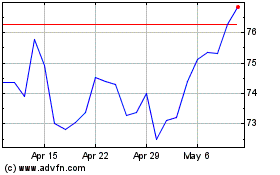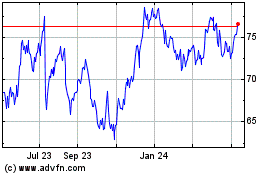The One Word Giving Money Managers Headaches in 2018: Liquidity
March 31 2018 - 8:29AM
Dow Jones News
By Justin Baer
U.S. regulators are willing to spare money managers from telling
shareholders more details about their holdings in hard-to-sell
assets. But they still want to see that information for
themselves.
Mutual-fund managers are now scrambling to meet new Securities
and Exchange Commission rules requiring them to classify their
investments by how easily they could be sold to meet investor
redemption requests.
"I've been thinking about this in stages of grief," said Kevin
Ehrlich, chief compliance officer at Western Asset Management Co.
"I'm now in the acceptance stage."
The industry argued that classifying all of their funds'
holdings into these buckets would be an onerous and complex task,
forcing them to make imprecise judgments that might be
second-guessed.
Money managers won a partial victory in March, when the SEC
proposed tabling the part of the rule that would have forced
managers to disclose those classifications to the public. But the
underlying information will still have to be turned over to
regulators starting in 2019.
Some firms, particularly small ones with little or no debt
holdings, will have an easier time getting ready for the new rules,
Mr. Ehrlich said. But many others have concluded they need an
outside firm to help with the new calculations.
Managers cited State Street Corp., Bloomberg LP and
Intercontinental Exchange Inc. as among those that have emerged as
top choices in providing this service to investment firms.
One sign of how the rules are affecting the industry came during
a conference in January, when Nathan Greene, a partner with the law
firm Shearman & Sterling, asked the audience: "Who's ready for
the liquidity rule?" After a number of hands shot up, Mr. Greene
posed a follow-up question: "How many of you are vendors?" Most of
those same attendants raised their hands again, he said.
The collapse of Third Avenue Management's Focused Credit Fund in
December 2015 trained a spotlight on how mutual funds unload
hard-to-sell bonds when the credit markets seize up.
In 2016, the SEC adopted the new rules requiring funds to review
liquidity risks and hold a minimum amount of liquid securities,
while formalizing a cap on the amount of illiquid holding to 15% of
the fund's net assets. The provision also compelled firms to give
the SEC regular snapshots of their funds' buckets.
It's a complicated task, with many factors that can affect a
bond's liquidity. Newer bonds tend to trade more often than older
ones, and larger issues are bought and sold more than smaller
bonds, said Eric Jacobson, a senior manager research analyst at
Morningstar Research Services LLC. Many higher-quality bonds are
also traded by more investors than riskier credits, he added.
There are other components to calculating how hard it will be to
sell those securities in a pinch, such as how much of a fund's
holdings they represent -- or even how much sway the manager has
with the Wall Street banks serving as intermediaries between
sellers and buyers, managers say.
"The problem is that there are several dimensions to liquidity,"
Mr. Jacobson said.
(END) Dow Jones Newswires
March 31, 2018 08:14 ET (12:14 GMT)
Copyright (c) 2018 Dow Jones & Company, Inc.
State Street (NYSE:STT)
Historical Stock Chart
From May 2024 to Jun 2024

State Street (NYSE:STT)
Historical Stock Chart
From Jun 2023 to Jun 2024
